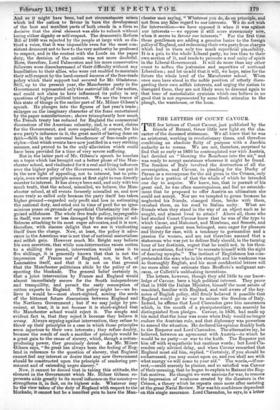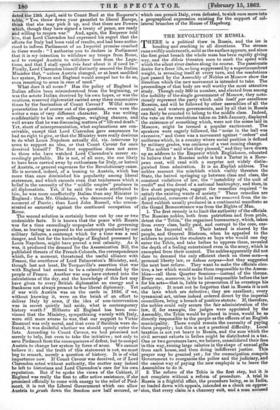THE LETTERS OF COUNT CAVOUR.
THE few letters of Count Cavour, just published by the friends of Ratazzi, throw little new light on the cha- racter of the deceased statesman. We all knew that he was an aristocrat, working in revolutionary times, and therefore combining an absolute fixity of purpose with a Jacobin audacity as to means. We are not, therefore, surprised to find that so early as 1856 he contemplated war with Austria, had decided on "blowing the Bourbons into the air," and was ready to accept assistance wherever it might be found. The freedom of Italy involved the destruction of all the sovereignties, and Cavour, in pleading for the Duchy of Parma as a recompense for the aid given in the Crimea, only asked for a portion of that the whole of which he intended one day to acquire. We knew, too, that in pursuit of his great end, he was often unscrupulous, and feel no astonish- ment that he proposed to offer Austria an ultimatum she could not accept. Nor are we tempted to groan because he neglected his friends, changed them, broke with them, crushed them, on his road to Italian unity. What are friends when they stand in the why of an object such as he sought, and almost lived to attain? Above all, those who had studied Count Cavour knew that he was of the type to which Cassar, and Mahomet, and Mirabeau, and Somers, and many another great man belonged, men eager for pleasure and thirsty for ease, with a tendency to gormandize and a passion for women, and are not therefore amazed that a statesman who was yet to deliver Italy should, in the turning hour of her destiniea, regret that he could not, in his thou- sand avocations, find time " to recreate himself with the sight of dancing nymphs." The instinct of Englishmen has com- prehended the man who in his strength and his weakness was so thoroughly English, and his most confidential letters will no more alter our estimate than Brofferio's malignant sar- casm or Culletti's unblushing inventions. The letters, however, though they add little to our know- ledge of Cavour, have a high political interest. They prove that in 1856 the Italian Minister, himself the most astute of mankind, familiar with England, and well aware of the key- notes of English policy, still firmly believed it possible that England would go to war to secure the freedom of Italy. Indeed, he affirms that Lord Clarendon gave him assurances which, in the mouth of a plenipotentiary, can scarcely be distinguished from pledges. Cavour, in 1856, had made up his mind that the hour was come when Italy would no longer endure the Austrian rule and that diplomacy was powerless to amend the situation. He declared his opinion frankly both to the Emperor and Lord Clarendon. The alternative lay, he believed, between an agreement with Austria—to which he would be no party—or war to the knife. The Emperor put him off with sympathetic but cautious words ; but Lord Cla- rendon only advised delay, and when Cavour remarked that England must aid him, replied, "Certainly, if you should be embarrassed, you may count upon us, and you shall see with what energy we will come to your aid." The words,—ifcor- rect,—could scarcely be plainer, and so satisfied was Cavour of their meaning, that he began to explain to Ratazzi the Eng- lish motives. He thought we were anxious for war, to remove the impression of weakness created by the disasters in the Crimea, a theory which he repeats once more after assisting at the great Naval Review. Nor was his confidence dependent on this single assurance. Lord Clarendon, he says, in a letter dated the 13th April, said to Count Buol at the Emperor's table, "You throw down your gauntlet to liberal Europe, think that she may pick it up, and that there are Powers which, though they have signed a treaty of peace, are ready and willing to reopen war.' And, again, the Emperor told him, that Lord Clarendon had expressed his regret that the efforts for Italy had been void of results, and had been autho- rized to inform Parliament of an Imperial promise couched in these words : "I authorize you to declare in Parliament that it is my intention to withdraw my troops from Rome, and to compel Austria to withdraw hers from the Lega- tions, and that I shall speak tres haut about it if need be." Finally, Lord Clarendon himself distinctly assured the Italian Minister that, "unless Austria changed, or at least modified her system France and England would compel her to do so, even resorting to arras in case of need." What does it all mean ? Has the policy of England in Italian affairs been misunderstood from the beginning, or was the astute Italian deceived by his own hopes, or was the cautious, reserved diplomatist carried away three consecutive times by the fascination of Count Cavour ? Wilful misre- presentation is of course out of the question, even were the writer a man of very different character. He was writing confidentially to his own colleague, weighing chances, and well aware that he was discussing matters of" life and death." Yet, short of misrepresentation, what explanations are con- ceivable, except that Lord Clarendon gave assurances he had no right to give or that the Ministry were really desirous to do what Louis Napoleon actually did, viz, intervene by arms to support an idea, or that Count Cavour for once deceived himself? The first supposition does not seem to those who have watched Lord Clarendon's career ex- ceedingly probable. He is not, of all men, the one likely to have been carried away by enthusiasm for Italy, or hatred of Austria, or general eagerness for the Revolutionary cause. He is accused, indeed, of a leaning to Austria, which has more than once diminished his popularity among liberal statesmen, and which exceeds even that tenderness which a belief in the necessity of the "middle empire" produces in all diplomatists. Yet, if he said the words attributed to him he was more unaffectedly Italian than any Minister in England : than Mr. Gladstone, who denounced the impri- sonment of Poerio ; than Lord John Russell, who remon- strated so earnestly against the continued occupation of Rome.
The second solution is certainly borne out by one or two undeniable facts. It is known that the peace with Russia was for a time exceedingly unpopular with the governing class, as leaving us exposed to the contempt produced by our military failures, a contempt which for a time was a real danger, and but for the knowledge of England possessed by Louis Napoleon, might have proved a real calamity. As it was, it produced the demand for the Assassination Bill, the published threats of the French Colonels, the correspondence which, for a moment, threatened the useful alliance with France, the overthrow of Lord Palmerston's Ministry, and, though last not least, De Tocqueville's assertion that war with England bad ceased to be a calamity dreaded by the people of France. Another war may have entered into the calculations of the day, and the knowledge of this fact may have given to every British diplomatist an energy and a frankness not always present to tar liberal diplomacy. Yet if war with Austria was on the cards in 1856, if we, without knowing it, were on the brink of an effort to deliver Italy by arms, if the idea of non-intervention was in secret quietly laid aside, what is contemporary history worth ? Hitherto all England has been con- vinced that the Ministry, sympathizing warmly with Italy, were still more averse to war, that our support to Victor Emanuel was only moral, and that even if Sardinia were de- feated, it was doubtful whether we should openly enter the lists. According to Count Cavour, we had promised not merely to help, but even to take the initiative ; not only to save Piedmont from the consequences of defeat, but to compel Austria to change her system by force of arms. We cannot believe it: and the truth of this statement is not, we must beg to remark, merely a question of history. It is of vital importance now. If Count Cavour was deceived, or if Lord Clarendon acted without authority, the matter may indeed be left to historians and Lord Clarendon's care for his own reputation. But if he spoke the views of the Cabinet, if England was really the first to offer active assistance, if she promised officially to come with energy to the relief of Pied- mont, it is not the Liberal Government which can allow Austria to krush down the freedom now half secured, or which can permit Italy, even defeated, to sink once more into a geographical expression existing for the support of col- lateral branches of the House of Hapsburg.































 Previous page
Previous page